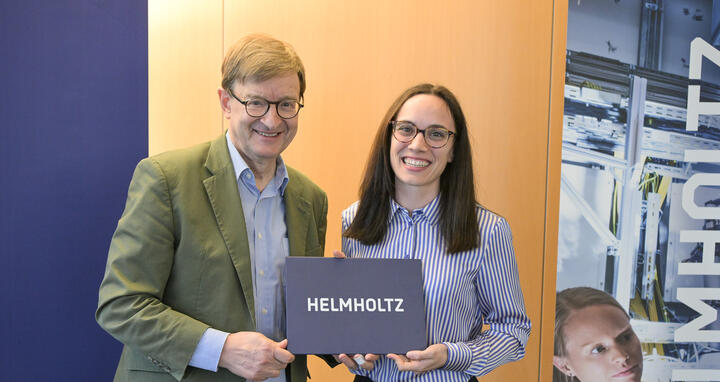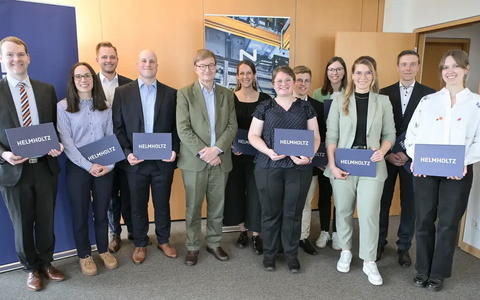Clara Vázquez García wins Helmholtz Doctoral Award
Every year, the Helmholtz Association awards prizes for the best and most original doctoral theses in Helmholtz’s six Research Fields. Among the winners this year is Clara Vázquez García, a post-doc in the Immune Mechanisms and Human Antibodies lab of Professor Kathrin de la Rosa at the Max Delbrück Center.
The Helmholtz President surrounded by the doctoral prize winners (from left to right): Marvin Carl May, Clara Vázquez García, Stephan Hilpmann, Lars Grundhöfer, Otmar D. Wiestler, Laura Helleckes, Monica Keszler, Benedikt Wagner, Hanna Trzesniowski, Celia Dobersalske, Tim Ziegler, and Vanessa Stenvers.
Recipients of the track B Doctoral Award receive €5,000 plus a Field Study Fellowship. The fellowship comes with a budget of up to 23,000 € for personnel and material costs, to be exclusively spent on conducting research to assess whether there is a market for their product. Vázquez García’s fellowship will begin in January of 2026.
Doctoral students and post-docs can also apply for the Helmholtz Field Study Fellowship separately. To boost her chances of winning a fellowship at all, Vázquez García applied for both. In a lucky twist of fate, she won both.
“I did not anticipate that at all,” she says. The details of how both fellowships will be apportioned are still being worked out. In any case, the funding will help her explore the needs and preferences of potential customers of a tool she developed, which measures how well person’s DNA repairs itself and the fitness of their immune system.
A boost for personalized medicine
Vázquez García has developed a technology called SWItch-joint Breakpoint Repertoire Identification (SWIBRID), which can characterize the diversity of DNA damage in genes that code for antibodies. To ensure the body can recognize and neutralize a wide variety of pathogens, genes that code for antibodies continually break, shuffle and are repaired. This process leaves the DNA inside B cells with “scars,”– mutations or genetic rearrangements. “SWIBRID can detect such human immune cell defects with 99% accuracy,” says Vázquez García.
“We generally see that people with an inefficient DNA repair system have less diverse scars,” she explains. “These individuals have cells that carry unrepaired DNA breaks, which in the majority of cases, die and thus can’t be analyzed.” Identifying these people is key because they are at a greater risk at developing diseases like cancer, she adds.
“The moment I saw we could distinguish between people with DNA repair defects and healthy controls, I realized the potential of SWIBRID to perhaps personalize preventative treatment,” says Vázquez García “I knew it needed to reach the clinic so that people could benefit from it.”
Text: Gunjan Sinha







